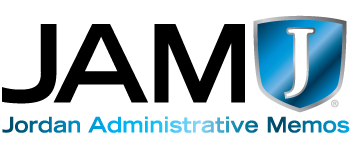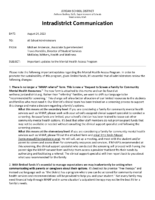DATE:
August 24, 2023
TO:
All School Administrators
FROM:
Michael Anderson, Associate Superintendent
Travis Hamblin, Director of Student Services
McKinley Withers, Health and Wellness
SUBJECT:
Important updates to the Mental Health Access Program
Please note the following important updates regarding the Mental Health Access Program. In order to promote the sustainability of this program, given limited funds, it’s essential that all administrators review the following changes:
- There is no longer a "MHAP referral" form. This is now a "Request to Screen a Family for Community Mental Health Resources.” The new form is attached to this memo and can be found at wellness.jordandistrict.org. Rather than "referring" families, we want to shift our language to be "recommended for screening." This change will allow better allocation of our limited resources to the students and families who most need it. Our District’s clinical team has been trained on a screening process to support this change and make a decision regarding a family’s options.
- What this means at the secondary level: if you are considering a family for community mental health services such as MHAP, please work with your school's assigned clinical support specialist to conduct a screening. Because funds are limited, your school’s clinician has been trained to tease out other community mental health options. It’s best that other staff members do not promise grant funds that may not be available or needed without consulting the clinical support specialist and following the screening process.
- What this means at the elementary level: if you are considering a family for community mental health services such as MHAP, please fill out the attached form and email it to Kevin Mossel (kevin.mossel@jordandistrict.org). He will call, set up a meeting, and meet with the student and/or parent to screen and assess them for community resources and services. If MHAP is recommended at this screening, the clinical support specialist who conducted the screening will proceed with having the parent sign the MHAP consent form and help them access a provider that best fits their needs by authorizing and facilitating a referral. The clinical support specialist will then report back to you about what was recommended for the family.
- With limited funds it’s essential to manage expectations we may inadvertently be setting when communicating with parents or caregivers about their options. It’s best not to promise “free therapy” and instead use language such as "the District has a program where you can be screened for community mental health services and recommendations will be provided to help you and your student." Not every family may need financial help through MHAP and in some situation’s outpatient therapy may not be the best fit for a family’s needs.
- We are no longer offering students "8 sessions" or "$800 of MHAP funds.” Please do not say this to a parent as it will not be accurate. If you opt to explain MHAP to a parent, it would be more accurate to say “we have a resource in the community that might help pay for some initial mental health services and get your student started quickly.” Then, the extent of the referral can be explained after a family has been screened and the recommendation was made after a more thorough review of available options.
Since its inception in 2020, over 2000 MHAP referrals have been made. We acknowledge your vital role in supporting students as they work to improve their mental health. If you have questions or issues with these changes, please contact McKinley Withers, Travis Hamblin, or Kevin Mossel in Student Services.

